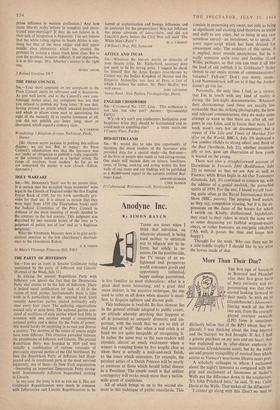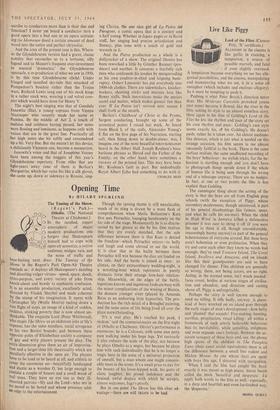More Than Their Due?
THE first sign of boredom in Bouvard and Pecuchet after their first great burst
A scholarly colleague to whom I exclaimed about the night's tameness as compared with the grip and excitement of Idomeneo at Sadler's Wells put the difference down to the conductors. 'It's John Pritchard here,' he said. 'It was Colin 9
Davis at the Wells. That makes all the difference.' I cannot go along with this. Don't we tend 10 ascribe to conductors more than is their due and function? I never yet heard a conductor turn a good opera into a bad one or an opera contain- ing (as ldomeneo does) a certain amount of dead wood into the entire and perfect chrysolite.
And the crux of the present case is this. Where- as the Glyndebourne version had a grave, classic nobility that reconciles us to a tortuous, silly legend and to Mozart's frequent over-investment in musical 'dramatics.' the Glyndebourne spectacle, a re-production of what we saw in 1950, is by this time Glyndebourne cliché. Under fringed and tasselled sky-tabs that smacked of Pompadour's boudoir rather than the Trojan wars, Richard Lewis sang one of his stock kings in a rather stock way, wearing a red velvet com- plet which would have done for Henry V.
The night's best singing was that of Gundula Janowitz (Ilia), a young soprano from Vienna Staatsoper who recently made her name as Pamina. By the middle of Act 2, a touch of malaise and coldness having passed, her notes were floating and luminous, as happens only with voices that are in the great line. Practically all her high notes she hit softly and crescendoed Up a bit. Very fine. But she mustn't let this device,' a deliciously Viennese one, become a mannerism.
Janowitz's voice and that of Josephine Veasey have been among the nuggets of this year's Glyndebourne repertory. From roles that are light-years away (one of them is Berlioz's Marguerite, which her voice fits like a silk glove), she came up, down or sideways to Rossini, sing-
ing Clarice, the one nice girl of La Pietra del Paragone, a comic opera that is a century and a half young. Whether in legato pages or in florid stuff, her singing had precise articulation and fluency, plus tone with a touch of gold and warmth in it.
And the Pietra production as a whole is a dollyrocker of a show. The original libretto has been reworked a little by Gunther Rennert (pro- ducer) and another. It concerns a fearfully rich man who confounds his toadies by masquerading as his own creditor-in-chief and feigning bank- ruptcy. Osbert Lancaster has put everybody into 1900-ish clothes. There are sidewhiskers, knicker- bockers, shooting sticks and matinee hats like flower stalls. Such innovations make the purists scowl and mutter, which makes greater fun than ever. If La Pietra isn't revived next season I shall froth at the mouth.
Berlioz's Childhood of Christ at the Proms, Sargent conducting, brought up some of the acoustical points I raised last week. As heard from Block L of the stalls, Alexander Young's E flat on the first page of his Narration, starting soft, then fining down to double-piano, was, I imagine, one of the most beautiful tenor notes ever heard in the Albert Hall. Joseph Rouleau's bass- baritone phrases as Herod and the Father of the Family, on the other hand, were sometimes a travesty of the printed line. This may have been Mr. Rouleau's fault in part. But undoubtedly Royal Albert Echo had something to do with it.
CHARLES REID































 Previous page
Previous page